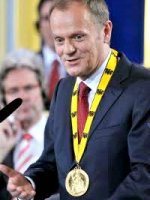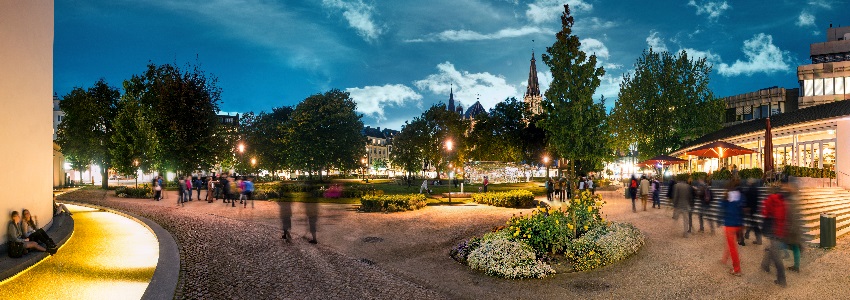Citation of the Board of Directors of the Society
for the Conferring of the International Charlemagne Prize of Aachen
in Honour of the Prime Minister of the Republic of Poland
Donald Tusk
 In the first decade of the emergent 21st century, there has evolved out of the original Community of Six the Union of 27 – a union that is the fundament for a lasting order of peace and freedom and of stability and prosperity for future generations on the entire continent. Two decades after the fall of the Iron Curtain, that which the Aachen City Council and the Board of Directors of the Society of the Conferring of the International Charlemagne Prize of Aachen only dared to hint at in cautious hope in the declaration jointly adopted in 1990 has now become reality: the comprehensive union of Europe. Europe now breathes “with both lungs again”. This beautiful metaphor, once used by Pope John Paul II in alluding to West Europe’s reunification with its eastern-central and southeast European neighbours, describes the riches that have been acquired by the Union.
In the first decade of the emergent 21st century, there has evolved out of the original Community of Six the Union of 27 – a union that is the fundament for a lasting order of peace and freedom and of stability and prosperity for future generations on the entire continent. Two decades after the fall of the Iron Curtain, that which the Aachen City Council and the Board of Directors of the Society of the Conferring of the International Charlemagne Prize of Aachen only dared to hint at in cautious hope in the declaration jointly adopted in 1990 has now become reality: the comprehensive union of Europe. Europe now breathes “with both lungs again”. This beautiful metaphor, once used by Pope John Paul II in alluding to West Europe’s reunification with its eastern-central and southeast European neighbours, describes the riches that have been acquired by the Union.
If our continent has thus experienced transformations of unique and epochal dimensions, this is owing in quite outstanding measure to the Polish people’s love of freedom. For it is precisely the Polish people which has repeatedly risen up against the unnatural division of our continent. Its unshakeable determination to take its place in a free and unified Europe was among the driving forces which brought about the end of the Communist dictatorships on the other side of the former Iron Curtain and which made possible the reunification of Europe.
In tribute to an impressive life lived in the service of freedom and democracy and in recognition of his distinguished service in the cause of understanding and cooperation pursued by the Republic of Poland with its European partners, the Board of Directors of the Society for the Conferring of the International Charlemagne Prize of Aachen in the year 2010 honours in the person of the Prime Minister of Poland, Donald Tusk, a Polish patriot and a great European, who three decades ago, together with numerous members of the Solidarnoÿÿ (Solidarity) movement, laid the cornerstone of Europe’s reunification and who today stands in a special way for a democratic Poland, open to the world and integrated in the European family of nations.
Donald Tusk was born on 22 April 1957 in Gdaÿsk into an established Polish-Kashubian family, whose members had to endure forced labour and imprisonment in concentration camps during the period of German occupation. He lost his father, whose health was shattered in this period, while still in primary school. Tusk read history at the University of Gdaÿsk, completing his studies in 1980 with a thesis on the Polish independence fighter and national hero, Marshal Józef Pilsudski. By his own account, the brutal suppression of the workers’ protests in the winter of 1970 deeply affected him; while still a university student he quickly established contact with a number of dissidents. During the big wave of workers’ strikes in the summer of 1980 he took part in the founding of the Independent Polish Students’ Union and joined the Solidarity movement. After graduation he worked as an editor for the renowned Wydawnictwo Morskie (Maritime Publishers), also heading its trade union branch. Both as a regular writer for the “Samorzadnoÿÿ” (Self-Governance) weekly and in numerous protest marches, Tusk was among those who did not shy away from public confrontation, marching at the head of the demonstrations and not infrequently paying for this with wounds and injuries.
The imposition of martial law at the end of 1981 and the banning of Solidarity left the barely 24-year-old journalist with no chance of state employment. Thereafter he took a job as an ordinary worker, employed for seven years by the “Swietlik” private co-operative – run by like-minded dissidents – meanwhile continuing his political-journalistic activities underground.
After martial law was lifted Tusk became in 1989 deputy chief editor of the esteemed “Gazeta Gdanska”. He left the Solidarity movement and together with the prominent liberals Jan Krzysztof Bielecki and Janusz Lewandowski founded the “Liberal-Democratic Congress” (KLD), which stood above all for the market economy and privatization, and for Polish accession to the EU as soon as possible.
Having risen in the meantime to KLD chairman, Tusk was able in 1991 to join the Sejm as an elected member for the first time, only to lose his seat two years later in the early elections whose rescheduling was necessitated by the fall of the government headed by Hanna Suchocka. Following its decisive defeat the KLD merged with the Democratic Union to form the Freedom Union (UW), which in April 1994 elected Tusk deputy chairman. Three years later he won a seat in the Senate as representative of the Gdaÿsk voivodship (administrative entity), and was thereafter elected a deputy speaker of the Senate.
At the beginning of 2001 Tusk was one of the co-founders of the Civic Platform (PO) and as a PO candidate was re-elected to the Sejm in September of that year. Thereafter, as its deputy speaker and (from April 2003) PO chairman, Tusk rose to become one of Poland’s most influential (opposition) politicians, and was seen as one of the most promising candidates in the presidential elections in the autumn of 2005. But following a hard-fought campaign he had to concede defeat by his conservative opponent Lech Kaczynski.
Tusk assumed the parliamentary leadership of the PO and prepared to stand for the office of head of government. After the Sejm voted in September 2007 to dissolve itself, Tusk as opposition leader campaigned against Jaroslaw Kaczynski, the brother of his former opponent. Right up to the beginning of October there were few political observers who expected a change in the office of prime minister; but the now almost legendary TV debate on 12 October turned the tide. Tusk’s message on that Friday evening: I will so govern the country as to make it fit, finally, to meet the challenges of the 21st century.
To opponents who sometimes charged him with downright unpatriotic closeness to Poland’s German neighbours, he riposted deftly that of course he was pro-German – but also pro-Czech, pro-Slav and even pro-Russian; for his foreign and European policy agenda, unlike Kaczynski’s, was based on cooperation rather than confrontation.
With a total of over 40 percent of the vote, Tusk’s victory was a virtual landslide. Inaugurated in November as prime minister, he renewed to Poland’s partners in the European Union his promise to pursue a policy of cooperation among friends in a spirit of mutual trust: “We are working on a new Polish position, basically meaning that Poland is an active part of all changes taking place in the EU….We must endeavour to reach compromises and seek solutions to problems.”
By personally taking charge of integration policy towards the EU and by appointing Wladyslaw Bartoszewski – the internationally highly esteemed former foreign minister – State Secretary and Plenipotentiary for international dialogue, the Prime Minister acted right at the beginning of his tenure to set signals that were visible far and wide, indicating the great importance attached by the new Polish government to European policy. In his first government declaration on 23 November 2007, he announced the early signing of the Lisbon Treaty and Poland’s conversion to the euro as soon as possible. “This government will do everything possible to ensure that Poland and the Polish people are quickly ready for the euro.” In addition he spoke out in favour of improved relations to Germany, urging in this connection a revival of the “Weimar Triangle”, i.e. close cooperation between Warsaw, Paris and Berlin.
After weeks of difficult debate, Tusk was able to reach an understanding with President Kaczynski on the ratification of the EU reform treaty, which in April 2008 was approved by the Chamber of Deputies and the Polish Senate. When Kaczynski stated after the abortive referendum in Ireland that the treaty was “senseless” and that he would not sign it, Tusk countered, “These remarks by the President are very unfortunate.” Stressing that “ratification lies in the interests of Poland”, the Prime Minister recalled in unmistakeable terms that the President himself had shared in negotiating the Lisbon Treaty.
Kaczynski ultimately came round and hinted at his approval if all the other EU states ratified the Treaty. A few days after the second and favourable Irish referendum, the head of state finally signed the ratification document on 10 October 2009.
The necessity of partnership-focused cooperation in the EU is underscored by Tusk, for whom Poland’s success – also during the worldwide economic and financial crisis – “is inseparable from the success of the European Union….We see the biggest danger in a crumbling solidarity within the European Union, in growing national egotism, in protectionism….There can be only one strategy for all Europeans.”
The Polish Prime Minister also banks on more consensus on questions of the EU’s budget and energy policy. Along with the policy of partnership with the EU’s eastern neighbours, which he has pursued for some time, these policies are to be the focus of the Polish EU presidency in 2011, as Tusk announced some months ago. “Of the new EU members, we are the largest country and perhaps even the most important partner for the old soldiers of the Union. Consequently, in connection with our presidency, many states are counting on the new EU countries to seize the initiative and provide new impetus” (quoted by Polskie Radio, 14 January 2009).
In the person of the Prime Minister of the Republic of Poland, Donald Tusk, the Board of Directors for the Conferring of the International Prize of Aachen honours in the year 2010 an outstanding contender for freedom, democracy and human rights, who never bowed to the Communist regime; a convinced and convincing European, who is especially able to inspire the younger generation for Europe, who represents understanding, cooperation, solidarity and a Poland which is open to the world and firmly anchored in the European family of nations, and which has returned to the heart of Europe.




